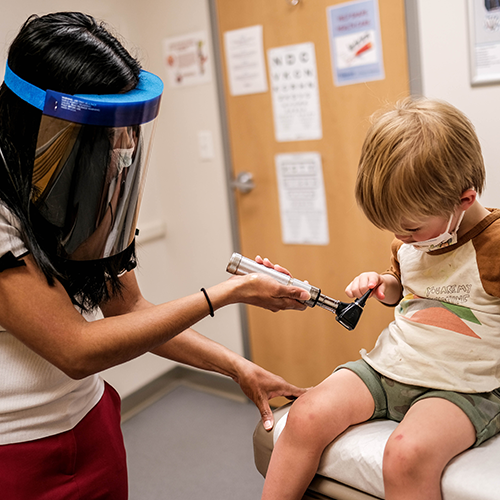We know parents want the very best for their children. To make sure your child stays healthy and happy, you may have quite a few questions for your child’s provider when you go in for their well-child visit.
Well-child visits or exams at Children’s Minnesota include: checking your child’s growth, well-being and development as well as offer guidance on nutrition, sleep, safety and other important topics.
We talked with Carolyn Solberg, pediatric nurse practitioner (PNP) at Children’s Minnesota, about the top five questions parents ask their PNPs or primary care provider during a well-child visit.
1. How do I help my young child who is a picky eater and has limited diet? Or, how do I get my child to eat enough fruits and vegetables?

Typically, parents with a child under the age of 5 ask ‘how do I help my child who is a picky eater?’ But parents with children of any age question how to get them to eat enough fruits and veggies.
While each primary care provider will have different ideas for you to try, here are three tips to get you started: involve your child with grocery shopping, be a role model and put healthy foods on your plate, and try the food-chaining tactic.
2. How much should my child be sleeping?
Babies and toddlers
Most times, parents of newborns are looking for advice on how to get their baby or toddler to sleep through the night. It’s recommended to keep the lights low and resist the urge to play with or talk to your baby at night. This helps send the message that nighttime is for sleeping. If possible, let your baby fall asleep in the crib at night so your little one learns that it’s the place for sleep.
Teenagers
Teenagers sometimes fall into the habit of staying up late, even on school nights. Which prompts many parents to ask ‘what if my teen doesn’t get enough sleep?’ The truth is, many teenagers don’t. Ideally, teens should try to go to bed at the same time every night, even on weekends, and wake up at the same time every morning, allowing for at least nine hours of sleep.
3. What if I’m concerned about my child’s mental health and behavior?
Parents of children with behavior issues typically bring this up at well-child visits. Some school-age children may have trouble listening to teachers or throw tantrums during class, while some teens may be having mental health issues that go beyond typical teenage mood swings.
If your primary care provider is concerned, they may talk to you about having your child see a behavioral health specialist to receive specialized help for more complicated issues.
At Children’s Minnesota, we understand that being a kid isn’t always fun and games. Our behavioral pediatrics professionals are here to help children navigate those obstacles. We offer a wide range of common childhood behavioral problems and mental health concerns.
4. Do you have advice for me about breastfeeding my newborn?
Parents of newborns tend to be extra cautious and will have lots of questions. They ask things about breastfeeding, lactation, how much their newborn should sleep and more. Your provider will offer guidelines and tips for feeding your newborn like choosing to breastfeed or bottle feed.
Newborns, especially in the first weeks, will spend most of their time sleeping but if you have other concerns, your primary care provider can answer all your questions.
5. Can you help my teen girl who has headaches, stomachaches and menstrual problems?
When girls grow up, they can start to experience issues that can be related to their period and premenstrual syndrome (PMS). Period can cause some uncomfortable symptoms like headaches, stomach aches, migraines and sometimes, they may even feel nauseated.
There are different ways to help your daughter if she has PMS or if she’s feeling moody.
- To help with food cravings: eat a balanced diet with lots of fresh fruit and vegetables.
- To ease bloating: lower salt in her diet.
- To ease crankiness or anxiety: avoid caffeine and get plenty of exercise.
- To help with backache, headache, or sore breasts: try a warm heating pad or acetaminophen (Tylenol or store brand), ibuprofen (Advil, Motrin, or store brand), or naproxen (Aleve or store brand).
- To relax: try yoga or meditation.
If you find these strategies don’t work, reach out to your primary care provider for additional treatment options. Sometimes, girls can have underlying health issues that may need to be treated by a provider.
Well-child visits are a great opportunity to learn more and ask questions about your child’s health. If you or your child have any of these questions, schedule their well-child check at Children’s Minnesota today.